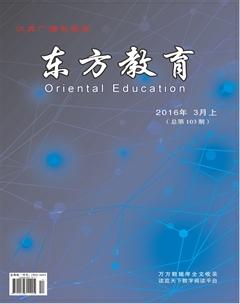Contrast of Aspect Expression in English and Chinese
王一好
Abstract:Aspects are defined as different ways of viewing the internal temporal constituency of a situation. This paper attempts to analyze the differences of aspect expressions between Chinese and English in detail from semantic perspective.
Introduction to Aspect
Aspect is one of the basic grammatical categories in linguistics. The concept of aspect is rather abstract,various definition are given by different grammarians. Comrie defines aspect as “different ways of viewing the internal temporal constituency of a situation”(1976,p. 3),which is accepted by most scholars.
Aspect focuses much on “different ways of viewing” actions. When describing a certain event or action in language,diverse aspects(meaning or form)could be employed to show features of different action processes. Aspect reflects observations of events existing in time by language users. In other words,aspect is how events or actions are viewed and experienced.
Each language has different ways of viewing time features of actions or events. Actions and events show various characteristics in different time process. Therefore,the notion of aspect should exist in every language.
Aspectual Form Only in English
Aspectual form refers to the inflection of verbs. Compared with other parts of speech,verb is the most active and has most changes in English. English verbs could have many forms to express different meanings,but Chinese verbs have single form,and have to resort to vocabulary method. For example,the verb “run” in English has the form of “ran”,“have run” and “is running”,but Chinese has only a word “跑” to express this action. “He ran” means the activity happened in the past. “He has run xxm” means the accomplishment of an activity. And “he is running” means that the activity is in progress. Through inflexion of verbs,English could express different aspectual meanings. To express the above three meanings,Chinese has to adopt the method of vocabulary. “他剛刚跑步了”,“他跑了xx米” and “他正在跑步” are their Chinese expressions. “刚刚” and “正在” are added to enrich of meaning of sentence.
Aspectual meaning is one of the meanings of the sentence,and is realized by many elements in the sentence. When analyzing aspectual meaning,it is necessary to analyze forms,which express aspectual meaning,as forms are the carriers of meaning.
Scholars who assert Chinese does not have aspect mainly consider in terms of aspectual form. This is one of the major differences between English aspect and Chinese aspect.
Chinese Particles to Express Aspectual Meaning
Chinese also has its specialties. “zhe”,“le” and “guo” added at verb endings are characteristics of Chinese. “le” usually expresses the completion of an activity. “zhe” shows that the action is underway. “guo” demonstrates that somebody has experienced something or some event. They have no specific meanings. “zhe”,“le” and “guo” are widely accepted as aspectual markings by Chinese grammarians and are discussed by many scholars. There are also other aspectual markings added to verb endings to express aspectual meanings. “qi lai” and “xia qu” should also be discussed in the scope of aspect.
“qi lai” is often regarded as expressing inceptive aspect. Think of the sentence:“他望着镜中的自己,莫名其妙的高兴起来”. The sentence means that the subject “ta” becomes happy. It is the inception of the state. In other situation,“qi lai” could also be used to demonstrate the inception of an event. “zai” could express aspectual meaning,expressing the event is in progress. Modal particles can also express aspectual meanings. “ne” can show the continuity of an activity. “lai zhe” expresses the event just happened recently.
Verb Reduplication Expressing Different Meaning in English and Chinese
In Chinese,there is a special form of verb reduplication to express a transitory action or event. This meaning could be listed as transitory aspect. It is neither durative nor punctual,and just falls in between. Compared with punctual aspect,the activity transitory expressed seems to occupy a time interval. For example:“你看看我,我看看你,两个人都不开心”. But compared with durative aspect,the activity seems to be more like a time point. For example:“荷花把头点了点,飞身纵出窗外”.
Although transitory aspect could last,the form does not emphasize the feature of duration. Comparing “他翻翻书” and “他翻着书”,the difference of durative aspect and transitory aspect is clearly seen. The form of transitory aspect will not combine with adverbs of time. For example,the sentence “他点点一会头” does not fit to the Chinese expression.
In English,there could be only one predicate verb in a sentence,so the form of verb reduplication does not exist. People may assert that English sentences “she combed and combed her hair” and “she talked and talked” are English form of reduplication,expressing meaning of repetition. However,this can only be viewed as parallel of English verbs,which is rather different from Chinese verb reduplication. Therefore,it could be said that verb reduplication is a unique form in Chinese.
References:
[1]Benard Comrie.(1976). Aspect. Cambridge University Press
[2]戴耀晶.(1997). 現代汉语时体系统研究. 杭州:浙江教育出版社.

